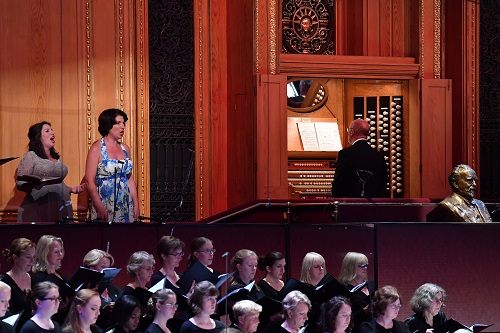
 United Kingdom 2017 BBCPROM 45 – Mahler: Elizabeth Watts (soprano); Elisabeth Kulman (mezzo-soprano); The Bach Choir; BBC Symphony Chorus & Symphony Orchestra / Sakari Oramo (conductor). Royal Albert Hall, London, 18.8.2017. (CC)
United Kingdom 2017 BBCPROM 45 – Mahler: Elizabeth Watts (soprano); Elisabeth Kulman (mezzo-soprano); The Bach Choir; BBC Symphony Chorus & Symphony Orchestra / Sakari Oramo (conductor). Royal Albert Hall, London, 18.8.2017. (CC)

(c) BBC/Chris Christodoulou
Mahler – Symphony No. 2, ‘Resurrection’
Few pieces are more suited to the Albert Hall’s space than Mahler’s Second, with its multiple choirs, its important, culminatory organ contribution and its use of off-stage brass (and indeed, at one point, an off-stage band). The central tenet of life vanquishing death, of one “rising again,” seemed particularly apt as this performance was dedicated to the memory of Jiří Bělohlávek, the previous Chief Conductor of the BBC Symphony Orchestra, who died on May 31 this year in Prague, aged 71. There is no doubting that Bělohlávek’s death was a great loss to the musical world, and there is no doubting, either, that the BBCSO had been lucky to have him.
Oramo’s tribute was well performed, even if the BBC’s flagship orchestra was not on the incendiary form it had found for Semyon Bychkov in Mussorgsky’s Khovanshcina earlier this season, where Jim Pritchard described the orchestra, rightly, as “impeccable” in his review. Antiphonal violins work well in this work (this is almost the standard Prom orchestra layout this year, judging by the ones I have attended, at least). If the depth of orchestral sound was not quite what Bychkov found for the Mussorgsky, it was equally as disciplined. Oramo has a very clear beat and ensemble was pretty much exemplary. His way with the music’s surface, too, was unsentimental – the flute and harp passage in the first movement was rattled through; in compensation, the passages which foreground double-basses were incredibly clear. A lack of some body in the upper strings would not be surprising from this orchestra if the Khovanshcina had not happened – somehow, Bychkov had largely erased the problem that particular evening.
The second movement, with its Ländler references, was frankly somewhat charmless, although undoubtedly highly rehearsed; its triumph was the pizzicato section for strings, a plateau of absolute delight. Opting then for a high-velocity Scherzo, this was well-behaved Mahler. Yes, again well-rehearsed, but the bucolic flavor was only really pronounced in the pair of clarinets and frankly it could have been more raucous at times.
Mezzo Elisabeth Kulman provided a direct link to Bělohlávek, having recorded the Dvořák’s Stabat Mater with him and the Prague Philharmonia for Decca (Michael Spyres, who featured in the Proms Berlioz Damnation de Faust – Prom 31 – was another of the soloists on that recording, just to widen the web of connections). Kulman sang ‘Urlicht’ from the front of the stage before exiting, later to reappear with Elizabeth Watts, the soprano soloist, with the choir, right next to the organ for their contributions to the finale. ‘Urlicht’ itself was wondrous, not least for a stunning oboe solo from Richard Simpson; leader Andrej Power’s solo violin contributions were first rank, too. Kulman’s especial emphasis on the word ‘Gott’ seemed to get to the heart of Mahler’s religiosity at this point in his life – we are a way yet from the God/Goddess of Nature of the Eighth Symphony second movement or the transcendent oneness of the ends of the Ninth Symphony and Das Lied von der Erde. The string diminuendo at the close of the fourth movement was completely magical – perfectly judged.
Out of that silence emerged the huge cry that launches the finale. It is, really, an Urschrei, a primodial orchestral scream that really should invoke Munch (the painter) at the very least. Here, it carried strength, if not a desperately unsettling power. The off-stage contributions in the fifth movement, however, were certainly the finest managed I have come across over more Mahler Twos than I care to count. An interesting quirk of the performance was that the four off-stage horns returned to the stage but instead of joining their colleagues, played at the side of the stage right next to the chorus, offering antiphonal horn sound.
All credit to Oramo for making Mahler’s doublings of the choir into a virtue (the trombones at ‘Unsterblich Leben!’); the choral work was a joy to hear, as was Elizabeth Watt’s simply radiant soprano. Watt’s ‘O glaube, du warst nicht umsonst geboren!’ had the sound of a mezzo around her – while Kulman started her career as a soprano before opting for mezzo roles, one had to wonder if Watts did this in reverse? Whatever the case, it was mightily impressive singing; the solo violin’s response to Watt’s enunciation of ‘Gelitten’ was another moment of magic. The two soloists’ voices were beautifully matched, too, as their passage together towards the close ‘O Schmerz! Du Alldurchdringer!’ showed beautifully.
The final peroration was expertly managed, with Oramo finding just the right sliver of space before the chorus’ climactic ‘Sterben’ and the organ a blaze of light around the massed choirs. The final orchestral section threatened to lose the tension so carefully wrought: curiously diffuse in this performance, it felt a little as if the organ came to the rescue at the very end.
Nevertheless, little caveats aside, this was a fitting memorial to the much-loved Jiří Bělohlávek.
Colin Clarke
For more about the Proms click here.